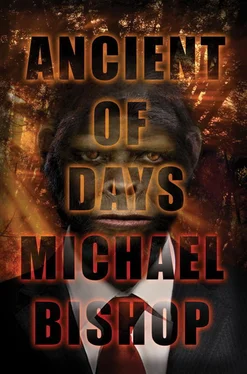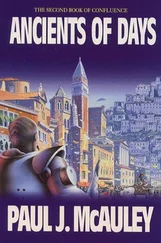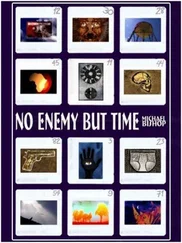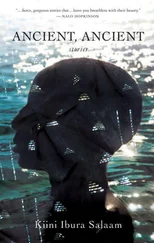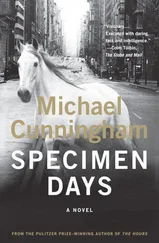“Well, you’re not, either—when your mind’s on nothing but the satisfaction of your appetites. Too often it is.”
“Tonight?”
“Not tonight. I hope. You seem to be trying hard to be as gentlemanly as it’s in you to be.”
Adam finished his meal. He wiped his mouth with a linen napkin. Then he picked up his stem of California burgundy and tossed it off in a noisy inhalation whose small component gulps set the apple in his throat bobbing like a fisherman’s cork. He wiped his mouth again, his small black eyes glittering.
“Adam!” RuthClaire admonished.
The habiline lifted his right hand and made a startling, pincerlike movement with his fingers. This motion he repeated, his broken-looking thumb swinging smartly from side to side. His thick black eyebrows, grown together over the bridge of his nose, lifted in sympathy, and his eyes, too, began to “talk,” coruscating in the candlelight.
RuthClaire interpreted: “The steak was excellent, he says. So, too, the wine.”
I stared at Adam. I had never seen him sign before. He continued doing so.
“Now he’d like to know if there’s a restroom on the premises,” RuthClaire continued. “He feels like a gallon of rainwater in an elastic teacup. He’d also like to wash his hands.”
“You’re making that up,” I said.
“Only the highfalutin metaphor. He really did ask if the West Bank has a public bathroom. Is that so hard to believe?”
The West Bank has only one public bathroom; it is located in a small cinder-block niche directly behind the dining room. For a brief moment you must step outside—into a small section of alley—to reach this facility, and you must lock the door behind you to keep other patrons or even the restaurant employees from breaking in upon you once you have entered. Still, complaints were few, and I didn’t have room to install a second water closet. The county health department had approved this arrangement.
Without another word to RuthClaire I led Adam to the WC, nodded him inside, and returned to the dining room. With only the three of us present, it made no difference that Adam neglected to depress the lock button in the doorknob. This was one of my half-formed thoughts as I slid back into my chair and put my hand on Ruthie Cee’s.
“You’ve been teaching him sign language.”
“Hardly an original idea. They’ve done it with chimps and gorillas for years. They do it at Yerkes. In fact, at Yerkes they teach some of their primates an elaborate system of geometric symbols called Yerkish. I checked out some books on sign language for the deaf to teach myself what Adam should learn. He’s doing better than any of the chimps and gorillas exposed to this system, though. It’s true. I’ve checked the literature.”
“It’s amazing,” I conceded.
“What convinced me to try was Adam’s interest in the woman doing simultaneous sign-language interpretations of McElroy’s sermons every Sunday morning. He couldn’t take his eyes off her. He still can’t.”
“You watch the program?”
“Adam’s fascinated by it. The wide-angle shots of the congregation, the singing, and McElroy’s contortions at the pulpit—they spellbind him. Adam found the channel back before the controversy that ignited some of McElroy’s most authoritarian recent pronouncements. I wasn’t purposely tuning in to see what he had to say about us, simply letting Adam watch whatever he wanted to watch.”
“Does he still insist on watching, knowing McElroy’s bias?”
“It’s his favorite Sunday show. But now he makes ugly hand-signal suggestions when McElroy cites my relationship with Adam as an example of latter-day moral decay. Adam hates Happy McElroy, but he loves the way he twists around, and the singing, and the interpreter for the deaf, and the long shots of that heroic congregation listening to Happy’s jeremiads.” RuthClaire smiled another off-center, self-effacing smile. “I can’t deny him those pleasures, Paul. He should know—intellectually, anyway—that there’s a big, smelly, bustling, contradictory world beyond Paradise Farm.”
“He must already know that.”
“Oh, he does. He’s told me jumbled stories about Montaraz, Haiti, and Cuba, not to mention the Freedom Flotilla and his trek up through Florida. He’s known more hardships and chaos than most, but not until lately could he share those experiences with anyone.”
We heard a thump at the back of the West Bank. Adam was returning from the water closet. At his elbow, towering awkwardly over Adam, was a stranger with a .38 in Adam’s ribs. Adam’s cautious step and frightened eyes affirmed that his knowledge of the world clearly extended to the destructive capacity of firearms. Maybe he remembered the fate of his conspecifics aboard the fishing vessel off the coast of Punta Gorda. Both indignant and fearful, I stood up to face this new intruder, who holstered his pistol in a sling under his jacket and steered Adam to our table with a remorseless meaty hand. His face bore an apologetic expression that automatically lessened my fear of him.
“Thought he might run,” the man said. “Didn’t, though.”
“I think you can safely let go of him,” RuthClaire said.
He did. “Dick Zubowicz, INS—Immigration and Naturalization Service. This fella’s an illegal alien. I’m afraid he’s under arrest.”
A knock rattled the front door. Despite failing to secure the rear door, I had locked the one in front. When I released the latch and opened to the slender supplicant on the raised sidewalk, this person proved to be Brian Nollinger. Behind him on the walk fronting the Greyhound Depot Laundry, a small crowd of shadows—five or six people—milled about. My first thought was that a sinister ulteriority underlay their presence, my second that they were waiting for the midnight bus to Montgomery. Then Nollinger swept inside past me, and I had no further time to consider the question.
“You’ve got him!” the anthropologist said to Zubowicz.
“It wasn’t hard,” the INS agent replied. “He’s pretty docile, really. Catchin’ ’em after they eat’s my favorite way of doin’ it, Dr. Nollinger. Takes the edge off ’em.”
I glared at my former boarder, who had led Zubowicz here and lain in wait with him outside the West Bank. He had influenced the government’s decision to mount this operation. I’ll show you how to nab the habiline with a minimum of fuss, he had promised, if you’ll give me and my sociologist friend at Emory visitation privileges once the poor devil’s interned. Nollinger paid little heed to either RuthClaire or me; he only had eyes for Adam. With difficulty, I mastered an impulse to slap his granny glasses off his pale face and grind them to powder under my heel.
RuthClaire stood. “Under arrest? For what?”
“I’ve told you, Mrs. Loyd,” Zubowicz said. “For entering the country illegally and then fleeing INS authorities, and you, ma’am, aided and abetted him.”
“Am I under arrest, too?”
“If you help us—if you don’t go contestin’ or obstructin’—it’s not likely you’ll be slapped too bad for your involvement.”
RuthClaire looked at me. “No one’s pressed any charges yet, and they’ve already begun plea-bargaining.”
“That’s not really the term for it,” Zubowicz said softly, as if offended by the innuendo. “Our real interest’s in Adam here.”
“The illegal alien,” Nollinger added.
“The only surviving specimen of Homo habilis in the entire world,” I interjected. “You think your rights outweigh his, Nollinger, because he’s a unique chance for bigger government grants and a measure of parasitic fame for ol’ Number One—not because he’s an illegal alien.”
Adam was following our argument closely, looking from face to face as each of us spoke and running a forefinger along the edge of the tablecloth. His nail had incised a narrow crescent in the material. A single maroon thread was caught in the notch at the top of this nail. The thread shuttled back and forth with the motion of Adam’s finger, like a minuscule red script on a parchment of the same concealing color. What did it mean? What was Adam thinking?
Читать дальше
